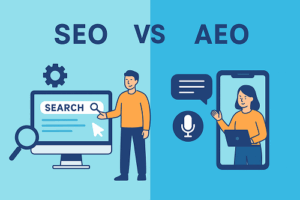Introduction
In the current digital era, having a good online presence is crucial for both individu als and businesses. Search engine optimisation, also known as SEO, is one of the best strategies to increase your online presence. The practise of SEO involves making adjustments to your website to improve its position on search engine result pages (SERPs). There are a number of potent tools and strategies accessible for individuals who utilise WordPress as their content management system (CMS) to improve your SEO efforts. We will examine the realm of WordPress SEO in this in-depth guide, providing insightful analysis and helpful pointers to assist you in moving up the search engine results pages.
Chapter 1: Understanding the Basics of SEO
1.1 What is SEO?
Search Engine Optimization (SEO) is a digital marketing strategy aimed at improving a website’s visibility in search engine results. The primary goal is to increase organic (non-paid) traffic to your website by ranking higher in search engine rankings, particularly on platforms like Google, Bing, and Yahoo.
1.2 Why is SEO Important?
SEO is vital for several reasons:
Increased Visibility: Higher search engine rankings lead to more visibility, which can result in increased traffic to your website.
Credibility and Trust: Websites that rank high in search results are often seen as more credible and trustworthy by users.
Improved User Experience: SEO involves optimizing the user experience, making your site more user-friendly and appealing.
Higher Conversion Rates: Better rankings can lead to more conversions and sales for businesses.
1.3 The Role of Keywords in SEO
Keywords are the foundation of SEO. They are the words and phra ses that users type into search engines when looking for information. Effective keyword research is crucial to understand what your target audience is searching for and how to optimize your content accordingly.
Chapter 2: Setting Up WordPress for SEO Success
2.1 Choose a Reliable Hosting Provider
Selecting a dependable hosting provider is the first step in setting up your WordPress site for SEO success. Factors to consider include site speed, uptime, security, and customer support.
2.2 Install an SEO-Friendly Theme
Your WordPress theme plays a significant role in SEO. Choose a theme that is mobile-responsive, fast-loading, and optimized for search engines.
2.3 Install Essential Plugins
WordPress offers a plethora of SEO plugins that can simplify your optimization efforts.
Two essential plugins are:
Yoast SEO: This plugin provides a user-friendly interface for optimizing your content and offers suggestions for improving your SEO.
Yoast SEO is a WordPress plugin that helps you improve your site’s performance and visibility in search engines. It also helps you create better content that is optimized for SEO and readability. Here are some of the things that Yoast SEO can do for you:
• It can automatically generate XML sitemaps, which are files that tell search engines how your site is structured and what pages to crawl.
• It can add title and meta description templates, which are snippets of text that appear in search results and describe what your page is about.
• It can integrate Schema.org structured data, which are pieces of code that help search engines understand the context and meaning of your content.
• It can analyze your content for SEO and readability, and give you suggestions on how to improve it. For example, it can check your keyword usage, readability score, internal links, image alt texts, and more.
• It can also recognize related keywords, synonyms, and different word forms of your keywords, which can help you write more naturally and rank for more variations of your main topic.
Yoast SEO is one of the most popular and trusted WordPress plugins for SEO.
All in One SEO Pack: Another popular choice, this plugin offers a wide range of SEO features, including XML sitemap generation and social media integration.
2.4 Set Permalinks Structure
WordPress allows you to customize your permalinks (URL structure). Choose a structure that includes keywords and is user-friendly. This can be configured in the WordPress dashboard under “Settings” > “Permalinks.”
Chapter 3: On-Page SEO Techniques
3.1 Keyword Research and Optimization
Keyword research involves identifying the keywords and phrases relevant to your content. Utilize tools like Google Keyword Planner or SEMrush to discover high-value keywords, and then strategically place them in your content, including titles, headings, and throughout the body.
3.2 High-Quality Content
Creating valuable, informative, and engaging content is paramount for SEO success. Content should be well-written, relevant, and provide solutions to users’ questions or problems.
3.3 Optimize Images and Media
Images and other media elements can significantly impact your website’s loading speed. Compress images and use descriptive file names and alt tags to improve SEO.
3.4 Internal Linking
Internal linking helps search engines navigate your website and understand the hierarchy of your content. It also keeps users engaged by guiding them to related articles or pages.
Chapter 4: Technical SEO for WordPress
4.1 XML Sitemaps
XML sitemaps help search engines index your website’s pages more efficiently. Many SEO plugins, such as Yoast SEO, generate XML sitemaps automatically.
4.2 Robots.txt File
The robots.txt file allows you to control which parts of your site search engines can or cannot crawl. Use this file to prevent indexing of irrelevant pages, such as login or admin pages.
4.3 Website Speed Optimization
Site speed is a crucial ranking factor. Use caching plugins like W3 Total Cache and optimize images to ensure fast loading times.
4.4 Mobile Responsiveness
With the increasing use of mobile devices, having a mobile-responsive website is essential. Choose a theme that is mobile-friendly, and test your site’s mobile usability with tools like Google’s Mobile-Friendly Test.
Chapter 5: Off-Page SEO and Link Building
5.1 Backlinks
Backlinks, or inbound links from other websites to yours, are a crucial aspect of off-page SEO. Quality backlinks from authoritative websites can significantly boost your site’s authority and rankings.
5.2 Social Media Engagement
Active engagement on social media platforms can indirectly impact your SEO. Sharing your content on social media can increase its visibility, potentially leading to more backlinks and traffic.
Chapter 6: Monitoring and Analytics
6.1 Google Analytics
Integrate Google Analytics with your WordPress site to monitor your website’s performance. Track metrics like traffic, user behavior, and conversions to make informed SEO decisions.
6.2 Google Search Console
Google Search Console provides valuable insights into your site’s indexing status and how Google sees your website. It also helps identify and resolve technical issues that may affect your SEO.
Chapter 7: SEO Best Practices and Tips
7.1 Stay Updated
SEO is a continually evolving field. Stay updated with the latest trends, algorithm changes, and best practices to maintain your SEO edge.
7.2 Avoid Black Hat SEO
Black hat SEO techniques, such as keyword stuffing and buying backlinks, can lead to penalties from search engines. Stick to ethical SEO practices for long-term success.
7.3 User Experience Matters
A positive user experience is not only crucial for SEO but also for retaining visitors. Ensure your website is easy to navigate and provides a seamless experience across all devices.
7.4 Patience is Key
SEO is a long-term strategy, and results may not be immediate. Be patient, and consistently implement best practices to see gradual improvements.
Chapter 8: Conclusion
Anyone wishing to enhance their online presence should consider learning WordPress search engine optimisation because it is a dynamic and complex field. You can improve your website’s exposure, draw in more organic visitors, and rank higher on search engines by using the ideas and tactics described in this thorough guide. Keep in mind that SEO is a continuous process, and that success over the long run depends on your ability to keep up with changes in the industry and modify your strategy accordingly. You can transform your WordPress website into a strong force in the online world with perseverance and the appropriate resources.
FAQ Questions
Q1: What is SEO, and why is it important for WordPress websites?
A1: SEO, or Search Engine Optimization, is a digital marketing strategy aimed at improving a website’s visibility in search engine results. It’s crucial for WordPress websites because it increases organic (non-paid) traffic, enhances credibility, improves user experience, and can lead to higher conversion rates.
Q2: How can I set up my WordPress website for SEO success?
A2: To set up your WordPress site for SEO success, follow these steps: choose a reliable hosting provider, install an SEO-friendly theme, install essential plugins like Yoast SEO, and configure your permalinks structure for keyword optimization.
Q3: What are some essential SEO plugins for WordPress, and how do they help?
A3: Two essential SEO plugins for WordPress are Yoast SEO and All in One SEO Pack. They provide user-friendly interfaces for optimizing your content, offer suggestions for improvement, generate XML sitemaps, and integrate with social media platforms, enhancing your site’s overall SEO performance.
Q4: What are the key on-page SEO techniques I should implement on my WordPress site?
A4: Key on-page SEO techniques for WordPress include conducting keyword research and optimizing content with relevant keywords, creating high-quality and informative content, optimizing images and media, and implementing internal linking strategies to improve navigation and user experience.
Q5: How can I optimize images and media for better SEO on WordPress?
A5: You can optimize images and media on WordPress by compressing images to reduce file size, using descriptive file names and alt tags, and ensuring that media elements do not slow down your website’s loading speed. Fast-loading media contributes to better SEO rankings.
Q6: What is the significance of internal linking in WordPress SEO?
A6: Internal linking involves adding hyperlinks within your content that direct users to other relevant pages on your website. It helps search engines navigate your site’s structure and hierarchy, enhances user experience, and distributes link authority throughout your site, improving SEO.
Q7: What are the technical SEO considerations specific to WordPress websites?
A7: Technical SEO for WordPress includes creating XML sitemaps for search engines, configuring the robots.txt file to control crawling, optimizing website speed by using caching plugins and optimizing images, and ensuring mobile responsiveness for users on various devices.
Q8: How can I create and submit XML sitemaps for my WordPress site?
A8: Many SEO plugins, such as Yoast SEO and All in One SEO Pack, can automatically generate XML sitemaps for your WordPress site. Once generated, you can submit them to search engines like Google through Google Search Console to improve indexing.
Q9: What is the robots.txt file, and how do I use it for SEO in WordPress?
A9: The robots.txt file is a text file that instructs search engine crawlers which parts of your website they should or should not crawl and index. You can use it in WordPress to prevent indexing of specific pages, such as login or admin pages, which are not relevant for search results.
Q10: How can I improve the speed and mobile responsiveness of my WordPress site for SEO purposes?
A10: To enhance your WordPress site’s speed and mobile responsiveness for better SEO, choose a mobile-responsive theme, use caching plugins like W3 Total Cache, optimize images, and regularly test your site’s mobile usability with tools like Google’s Mobile-Friendly Test.
Q11: What strategies can I employ for off-page SEO and link building with WordPress?
A11: Off-page SEO in WordPress involves building quality backlinks from authoritative websites to your content. Additionally, active engagement on social media platforms can indirectly impact SEO by increasing your content’s visibility, potentially leading to more backlinks and traffic.
Q12: How does social media engagement relate to SEO for WordPress websites?
A12: Social media engagement can positively impact SEO for WordPress by promoting your content, attracting more visitors, and potentially generating backlinks when others share your content. Social signals also indicate content relevance and popularity, which can indirectly influence search engine rankings.
Q13: Which tools should I use for monitoring and analytics in WordPress SEO?
A13: For monitoring and analytics in WordPress SEO, use Google Analytics to track metrics such as traffic, user behavior, and conversions. Additionally, Google Search Console provides insights into indexing status and helps identify and resolve technical SEO issues.
Q14: What are some best practices for maintaining effective SEO on a WordPress website?
A14: SEO best practices for WordPress include staying updated with industry trends, avoiding black hat SEO techniques, prioritizing a positive user experience, and understanding that SEO is a long-term strategy that requires patience and consistent implementation of ethical practices.
Q15: Is SEO a long-term strategy, and what kind of results can I expect to see over time?
A15: Yes, SEO is a long-term strategy. While some improvements may be noticeable relatively quickly, significant SEO results typically take time to materialize. Consistency in implementing SEO best practices and adapting to industry changes is key to achieving and maintaining higher search engine rankings.
Feel free to use these FAQ questions and answers to provide valuable information and address common queries related to WordPress SEO in your article or on your website.




